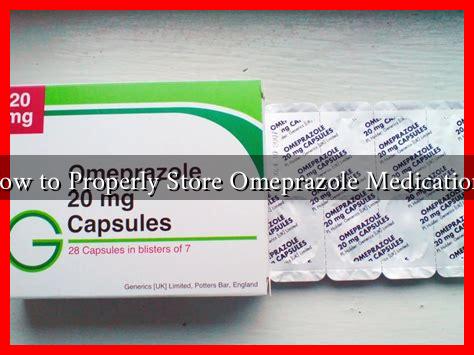-
Table of Contents
How to Properly Store Omeprazole Medications
Omeprazole is a widely used medication that belongs to a class of drugs known as proton pump inhibitors (PPIs). It is primarily prescribed to treat conditions such as gastroesophageal reflux disease (GERD), stomach ulcers, and Zollinger-Ellison syndrome. Proper storage of omeprazole is crucial to ensure its effectiveness and safety. In this article, we will explore the best practices for storing omeprazole medications, the importance of adhering to these guidelines, and the potential consequences of improper storage.
Understanding Omeprazole
Before delving into storage practices, it is essential to understand what omeprazole is and how it works. Omeprazole reduces stomach acid production by blocking the proton pumps in the stomach lining. This action helps alleviate symptoms associated with excessive stomach acid, such as heartburn and indigestion. However, like all medications, omeprazole can degrade if not stored correctly.
Optimal Storage Conditions
To maintain the potency and safety of omeprazole, it is vital to store it under optimal conditions. Here are some key guidelines:
- Temperature: Omeprazole should be stored at room temperature, ideally between 20°C to 25°C (68°F to 77°F). Avoid exposing it to extreme temperatures.
- Humidity: Keep omeprazole in a dry place. High humidity can lead to degradation of the medication. Avoid storing it in bathrooms or near sinks.
- Light Exposure: Protect omeprazole from direct sunlight. Store it in its original container, which is often designed to shield the medication from light.
- Child Safety: Always store omeprazole out of reach of children. Consider using child-proof containers to prevent accidental ingestion.
Common Mistakes in Storing Omeprazole
Many individuals unknowingly make mistakes when storing their medications. Here are some common pitfalls to avoid:
- Storing in the Bathroom: Bathrooms are often humid environments, which can compromise the integrity of omeprazole.
- Using Old Containers: Always keep omeprazole in its original packaging. Transferring it to other containers can lead to confusion and potential exposure to moisture or light.
- Ignoring Expiration Dates: Regularly check the expiration date on your omeprazole prescription. Using expired medication can be ineffective or even harmful.
Case Studies and Statistics
Research indicates that improper storage of medications can lead to significant health risks. A study published in the Journal of Pharmaceutical Sciences found that nearly 30% of patients reported storing their medications inappropriately, leading to reduced efficacy. In the case of omeprazole, improper storage can result in a decrease in its acid-suppressing capabilities, potentially exacerbating conditions like GERD.
Signs of Degradation
It is essential to be aware of signs that omeprazole may have degraded due to improper storage:
- Change in Color: If the tablets or capsules have changed color, it may indicate degradation.
- Unusual Odor: A strong or unusual smell can be a sign that the medication is no longer safe to use.
- Crumbling or Breaking: If the tablets are crumbling or breaking apart easily, they may have lost their potency.
Conclusion
Proper storage of omeprazole medications is crucial for maintaining their effectiveness and ensuring patient safety. By adhering to the recommended storage conditions, avoiding common mistakes, and being vigilant about signs of degradation, patients can maximize the benefits of their treatment. Always consult with a healthcare professional if you have questions about your medication or its storage. Remember, taking the time to store your medications correctly can make a significant difference in your health outcomes.

